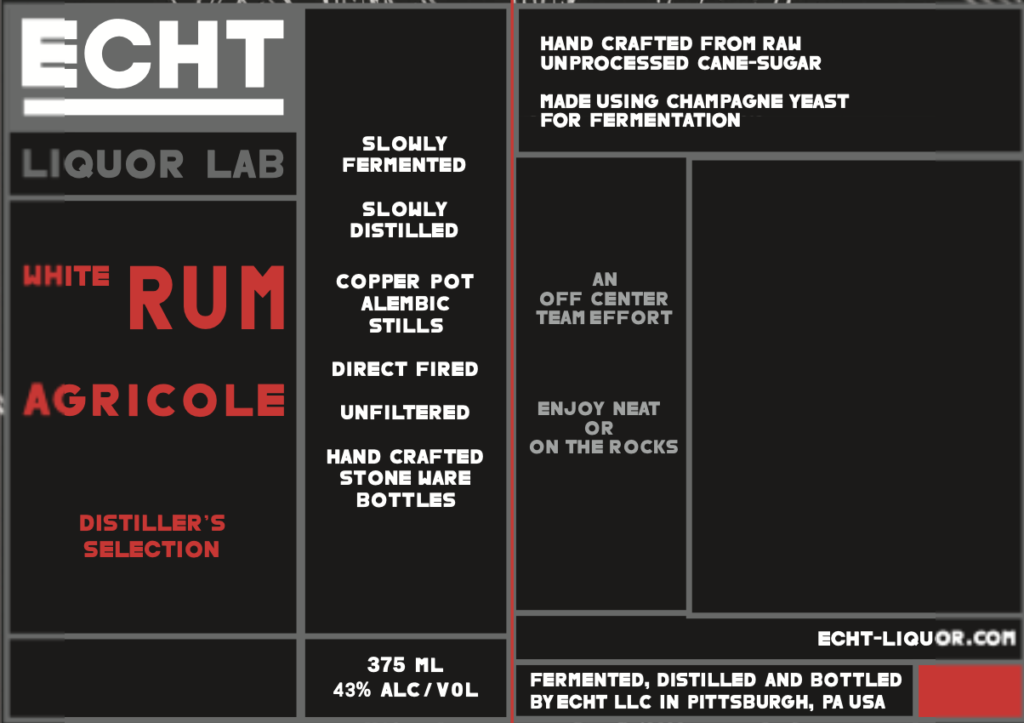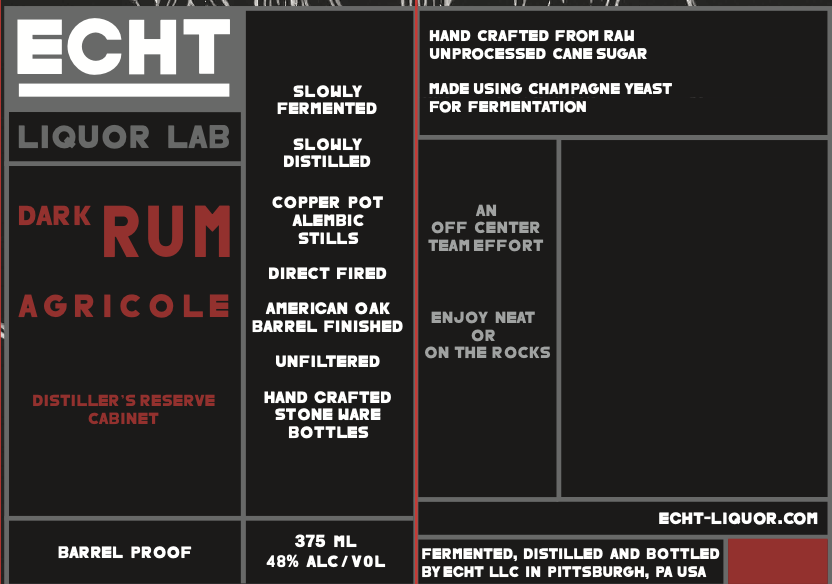Echt Liquor Lab in Pittsburgh received TTB label approval in June for two rums they’re labeling as “agricole”. Let’s look at the labels and see what might be confusing.
This probably won’t be my best written article as it’s been re-written and re-structured several times, so please bear with me.


It’s commonly thought that only certain rums can be called agricole (or agricultural) r(h)um. If you ask ten rum drinkers what an agricole rum is you might get ten different answers. And the answer to what is and isn’t an agricultural rum also depends on where you’re at – the European Union has very different regulations on the term than other countries, and you’ll find that the most vehement participants in any argument about these rums are European (and usually French).
For this article, I’m going to use the words agricole and agricultural as well as rhum and rum interchangeably. These are the same words in French and English, and when it comes to European Union regulations they’re both equally protected.
In America, there are no restrictions preventing you from calling any rum an agricole rum, and we’ve seen rums in Hawaii, Louisiana, and elsewhere apply the agricole label to their rums made with sugarcane juice. While the blood of purists starts to boil at the thought of a rum from the United States calling itself an agricole rum, there’s more here than just that on these two labels to raise an eyebrow at..
- Raw material. Agricole-style rums are made with fresh sugarcane juice. These are made with “raw unprocessed cane sugar”, which doesn’t tell us much other than the cane juice has already gone through processing to create the sugar.
- Stills. Agricole-style rums are often traditionally made with creole column stills, but French Charentais-style pot stills are also allowed in some areas.
I don’t see anything at all in these rums that I’d describe as agricole-style, and I’m actually puzzled about why they chose to describe them this way.
I started writing a much longer article about what it would actually take to make an agricole-style rum in Pennsylvania and talked about sourcing cane from Georgia, transporting it quickly in refrigerated trucks to reduce sucrose degradation, and crushing on site at the distillery. Fortunately for you I deleted it because it got too long and tedious, but let’s just say that it’s not commercially feasible for a distillery to do that. So let’s use this as an excuse to talk a little about what agricole/agricultural rums are and how these terms are legally defined.
Legally-compliant agricole rums
Aside from these labels, there’s also some confusion over what can legally be called a Rhum Agricole in France and other countries. In fact, I got in a heated argument with a French friend at Tales of the Cocktail this year over this. She argued that only rums made in France and in French territories can be called agricole rums, and I disagreed. So here’s a quick overview of the current status of that term.
- Martinique AOC: “Rhum Agricole Martinique”. This is a specific French AOC that applies to agricole rums made in Martinique according to legally-defined specifications. Guadeloupe has their own GI that covers rums labeled as “Rhum de Guadeloupe” or similar terms, but it covers a much broader range of rum styles as Guadeloupe distillers use other raw materials (molasses and cane syrup) and stills (pot stills in the Charentais style are allowed).
- European Union: “Agricultural”. European Union regulations define rums using the label “agricultural” in any language. These must be produced with sugar cane juice and must come from French Overseas Departments or Madeira (a region of Portugal).
Essentially, outside of the European Union there isn’t anything that requires agricole rum to conform to any standard. However, within the EU, agricole rum can only be made in French Overseas Departments (which includes Guadeloupe, Martinique, Reunion, and several others) and Madeira.
The United States doesn’t honor GIs or AOCs by default, so these terms aren’t regulated here. There are situations where this has changed in the past — for years the French government lobbied American legislators to restrict use of the term Champagne. In 2005, this finally happened, but with a catch. American wineries who previously (before March 2006) used European names like Champagne, Chablis, Sherry, and other terms to describe their wines could continue doing so. This is why you can still find Korbel and Cook’s Champagne at American supermarkets.
What about “Agricole Style”?
Some American producers do label their rums as agricole rum. KoHana in Hawaii and Oxbow in Louisiana both produce rums made with fresh sugar cane juice in the agricole style. Neither use a creole column still however.
A possible solution from Parmigiano Reggiano cheese
One possible solution could follow what Consorzio Parmigiano Reggiano has done in the United States. Faced with American cheese brands calling all sorts of hard cheeses “parmesan”, cheeses made under the Italian PDO of Parmigiano Reggiano are sometimes sold with a seal that consumers can see. It’s still up to the consortium to educate consumers to look for this seal, but it’s something that signifies that a product is the real thing. Perhaps something like this could be done with European Union-compliant agricole rums?

Minor point: Guadeloupe rums meeting the right requirements can also use agricole.
See the last paragraph of p. 231 of Modern Caribbean Rum:
“Additional information
The label wording Rhum of Guadeloupe may be supplemented by the terms blanc, brun, élevé sous bois, or vieux, followed by the terms agricole or de sucrerie.”
In essence, if cane juice, “agricole” is allowed. Otherwise, “de sucrerie” is what’s used instead.
Agreed. I probably wasn’t as clear as I should have been in some areas (at some point I got tired of rewriting this and just hit post), but I did mention that rums from Guadeloupe can be called agricole as well in one section.
I’m still scratching my head at what inspired those guys in PGH to call their rums agricole though..